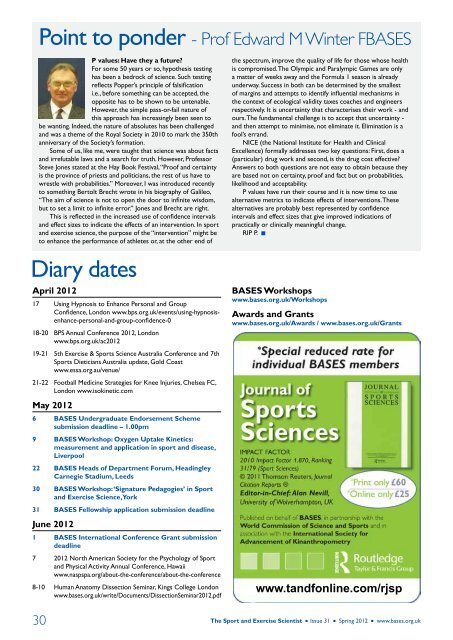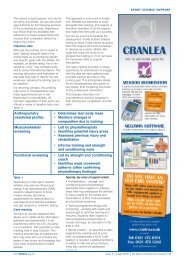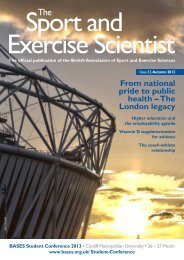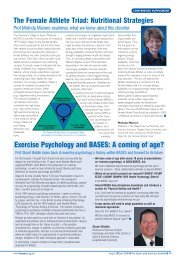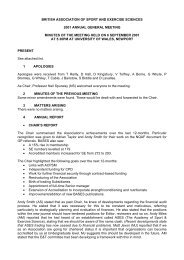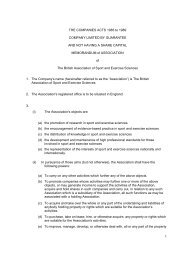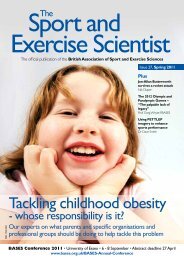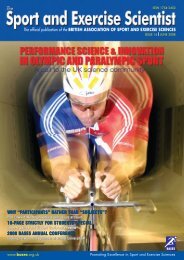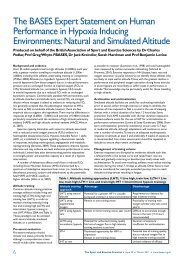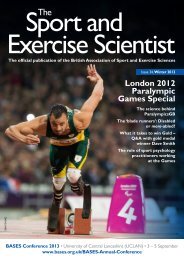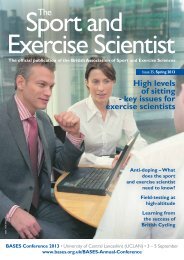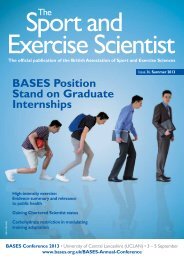Issue 31 Spring 2012 - Bases
Issue 31 Spring 2012 - Bases
Issue 31 Spring 2012 - Bases
You also want an ePaper? Increase the reach of your titles
YUMPU automatically turns print PDFs into web optimized ePapers that Google loves.
Point to ponder - Prof Edward M Winter FBASES<br />
P values: Have they a future?<br />
For some 50 years or so, hypothesis testing<br />
has been a bedrock of science. Such testing<br />
reflects Popper’s principle of falsification<br />
i.e., before something can be accepted, the<br />
opposite has to be shown to be untenable.<br />
However, the simple pass-or-fail nature of<br />
this approach has increasingly been seen to<br />
be wanting. Indeed, the nature of absolutes has been challenged<br />
and was a theme of the Royal Society in 2010 to mark the 350th<br />
anniversary of the Society’s formation.<br />
Some of us, like me, were taught that science was about facts<br />
and irrefutable laws and a search for truth. However, Professor<br />
Steve Jones stated at the Hay Book Festival, “Proof and certainty<br />
is the province of priests and politicians, the rest of us have to<br />
wrestle with probabilities.” Moreover, I was introduced recently<br />
to something Bertolt Brecht wrote in his biography of Galileo,<br />
“The aim of science is not to open the door to infinite wisdom,<br />
but to set a limit to infinite error.” Jones and Brecht are right.<br />
This is reflected in the increased use of confidence intervals<br />
and effect sizes to indicate the effects of an intervention. In sport<br />
and exercise science, the purpose of the “intervention” might be<br />
to enhance the performance of athletes or, at the other end of<br />
Diary dates<br />
April <strong>2012</strong><br />
17 Using Hypnosis to Enhance Personal and Group<br />
Confidence, London www.bps.org.uk/events/using-hypnosisenhance-personal-and-group-confidence-0<br />
18-20 BPS Annual Conference <strong>2012</strong>, London<br />
www.bps.org.uk/ac<strong>2012</strong><br />
19-21 5th Exercise & Sports Science Australia Conference and 7th<br />
Sports Dieticians Australia update, Gold Coast<br />
www.essa.org.au/venue/<br />
21-22 Football Medicine Strategies for Knee Injuries, Chelsea FC,<br />
London www.isokinetic.com<br />
May <strong>2012</strong><br />
6 BASES Undergraduate Endorsement Scheme<br />
submission deadline – 1.00pm<br />
9 BASES Workshop: Oxygen Uptake Kinetics:<br />
measurement and application in sport and disease,<br />
Liverpool<br />
22 BASES Heads of Department Forum, Headingley<br />
Carnegie Stadium, Leeds<br />
30 BASES Workshop: ‘Signature Pedagogies’ in Sport<br />
and Exercise Science, York<br />
<strong>31</strong> BASES Fellowship application submission deadline<br />
June <strong>2012</strong><br />
1 BASES International Conference Grant submission<br />
deadline<br />
7 <strong>2012</strong> North American Society for the Psychology of Sport<br />
and Physical Activity Annual Conference, Hawaii<br />
www.naspspa.org/about-the-conference/about-the-conference<br />
8-10 Human Anatomy Dissection Seminar, Kings College London<br />
www.bases.org.uk/write/Documents/DissectionSeminar<strong>2012</strong>.pdf<br />
the spectrum, improve the quality of life for those whose health<br />
is compromised. The Olympic and Paralympic Games are only<br />
a matter of weeks away and the Formula 1 season is already<br />
underway. Success in both can be determined by the smallest<br />
of margins and attempts to identify influential mechanisms in<br />
the context of ecological validity taxes coaches and engineers<br />
respectively. It is uncertainty that characterises their work - and<br />
ours. The fundamental challenge is to accept that uncertainty -<br />
and then attempt to minimise, not eliminate it. Elimination is a<br />
fool’s errand.<br />
NICE (the National Institute for Health and Clinical<br />
Excellence) formally addresses two key questions: First, does a<br />
(particular) drug work and second, is the drug cost effective?<br />
Answers to both questions are not easy to obtain because they<br />
are based not on certainty, proof and fact but on probabilities,<br />
likelihood and acceptability.<br />
P values have run their course and it is now time to use<br />
alternative metrics to indicate effects of interventions. These<br />
alternatives are probably best represented by confidence<br />
intervals and effect sizes that give improved indications of<br />
practically or clinically meaningful change.<br />
RIP P.<br />
BASES Workshops<br />
www.bases.org.uk/Workshops<br />
Awards and Grants<br />
www.bases.org.uk/Awards / www.bases.org.uk/Grants<br />
1.870<br />
www.tandfonline.com/rjsp<br />
30 The Sport and Exercise Scientist n <strong>Issue</strong> <strong>31</strong> n <strong>Spring</strong> <strong>2012</strong> n www.bases.org.uk


